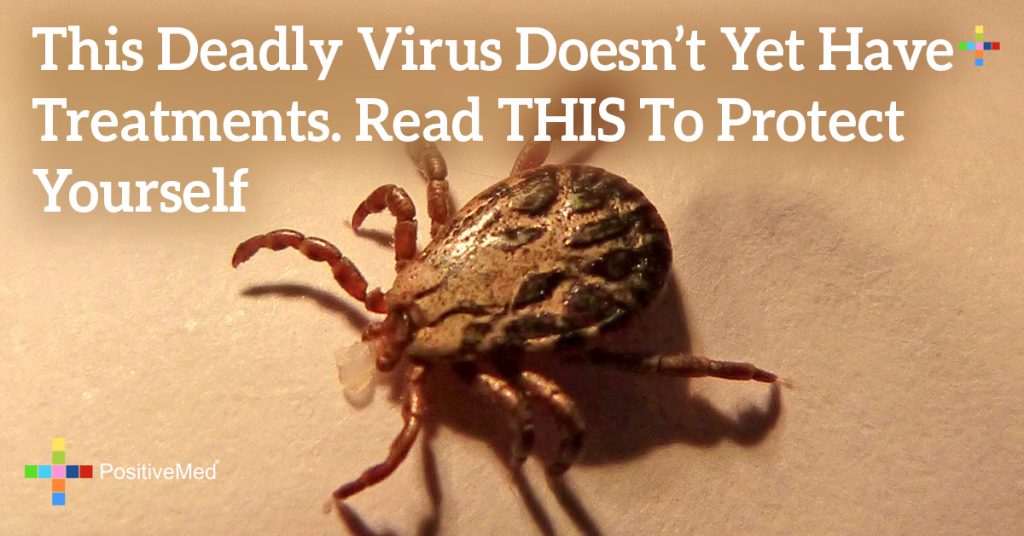
This Deadly Virus Doesn’t Yet Have Treatments. Read THIS To Protect Yourself
First identified after an otherwise healthy man in the county of Bourbon in Kansas died subsequent to tick bites, the Bourbon Virus, named after the location where Patient Zero contracted the disease, may be a new emerging threat. After Patient Zero was proven to have died from this newly-discovered illness, the Centers for Disease Control announced that many more cases of Bourbon Virus may have already occurred but have not yet been identified due to the recent identification of the illness.

Appearing as a dark red spot that grows following tick bites in the area, the Bourbon Virus does not yet have any treatment. In many ways, the Bourbon Virus resembles Lyme Disease, with suffers exhibiting symptoms like headaches, mood swings, joint pain, fatigue, red rashes, and bowel problems. Bourbon Virus does not respond to antibiotics so researchers will have to search elsewhere for a cure.
So far, only eight confirmed cases have been identified in the United States. Seven of the confirmed cases resulted in a fatality while one individual in Oklahoma was able to effect a complete recovery although doctors are unsure as to how this was possible. With no known cure, doctors are recommending that avoiding tick bites is the only reasonable precaution that people can take at this time. The CDC and the Kansas Department of Health are working to develop a simple test to quickly identify future cases of Bourbon Virus.
Veterinary researchers are working to determine whether the Bourbon Virus can be transmitted to wild animals or pets and veterinarians are advising pet owners to be sure to protect their animals with year-round tick protection.
RELATED ARTICLE: Lyme Disease is Common and Dangerous: How to Spot the Symptoms
Some experts speculate that the appearance of Bourbon Disease might be due to increased levels of ticks in the United States. Mason Reichard, a veterinary parasitologist at the National Center for Veterinary Parasitology in Oklahoma warned, “Due to the relatively mild winter overall and wet conditions in spring, ticks levels are now higher than ever.”
CDC researchers have now determined that the first victim of the Bourbon Virus was under age 50 and otherwise healthy. Several days after sustaining numerous tick bites, the Patient Zero became overwhelmed with vomiting, weakness, and diarrhea and had to be rushed to the hospital. While doctors are still working to determine the exact nature of the Bourbon Virus, one seemingly correlated result is that individuals with the disease have low counts of white blood cells and platelets as well as elevated liver enzyme levels. Unfortunately, despite urgent treatment, the Bourbon Virus has fatal results within two weeks.
The CDC believes that the Bourbon Virus is part of a class of microbial invaders known as Thogotoviruses. Unlike viruses such as Zika and malaria that grow and evolve inside the guts of mosquitos, thogotoviruses require an arthropod host, and that includes the common deer tick. Related viruses have spread to the animal population as they are able to be transmitted to both mammals as well as birds. Similar viruses have been identified in Africa after two people died of what may be Bourbon Virus but could be a related thogotovirus. Bourbon Virus, once confirmed as a new viral invader, will be the first known thogotovirus to infect human beings in the Western hemisphere.
The government is warning anyone who spends time in the outdoors engaged in activities like hiking or camping to follow smart practices to prevent tick bites. The government recommends anyone spending time outdoors to wear light-colored clothing with long sleeves and pants, using insect repellant, and maintaining daily vigilance for the presence of tick bites. If you do get bitten by a tick, seek medical attention promptly especially if you exhibit any signs of the illness.





